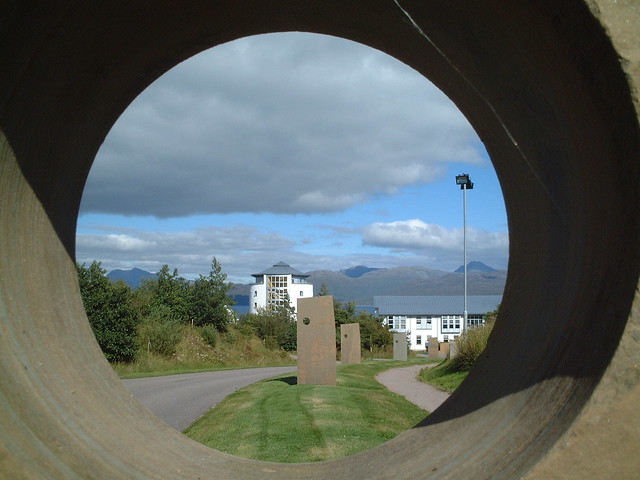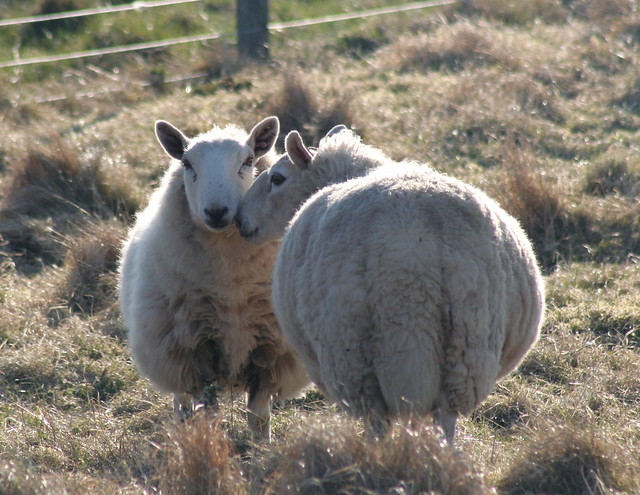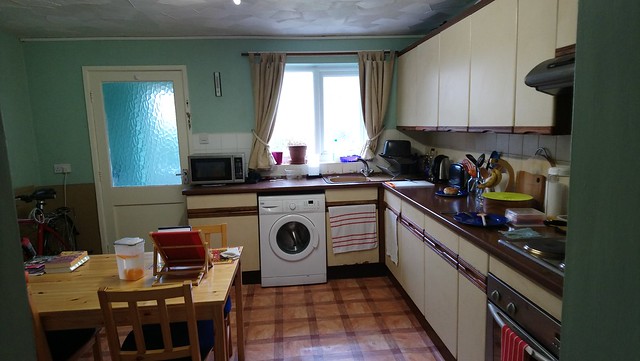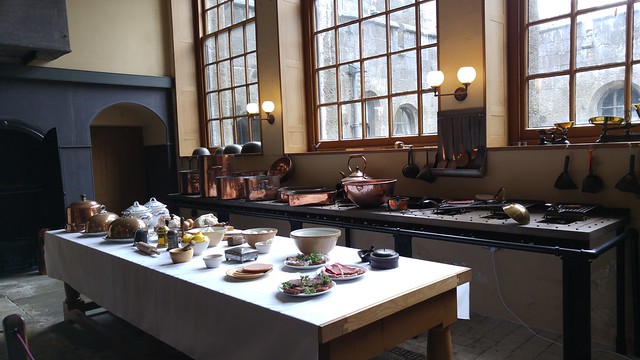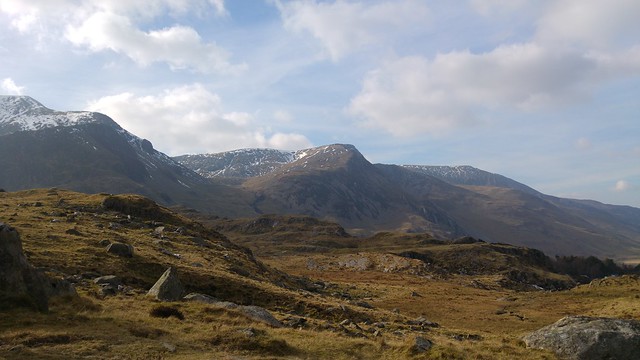Words for word, call, cry and related things in Celtic languages.
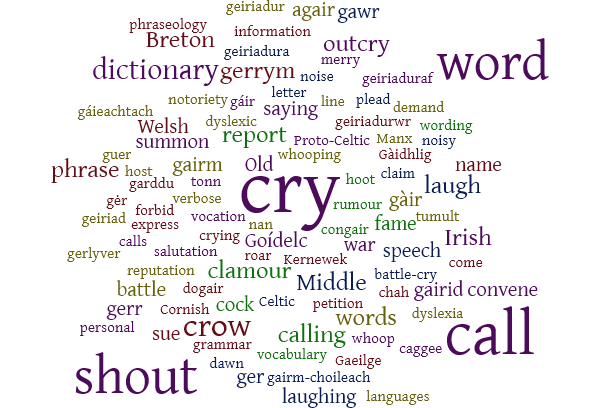
Word cloud created with WordItOut
Words marked with a * are reconstructions.
| Proto-Celtic | *gāri = shout, call *garyeti = to cry, shout *gar(r)man- = cry, shout *garyo- = word, command *garyos = call, cry |
|---|---|
| Gaulish | *Garomaros / Garo-marus = personal name adgarion = accuser (?) |
| Old Irish (Goídelc) | gairm = call, name, summons gairid [ˈɡarʲiðʲ] = to call, cry out, summon adgair [aðˈɡarʲ] = to summon congair [konˈɡarʲ] = to call, summon; invite dogair = to call |
| Middle Irish (Goídelc) | gairm = call, name, summons, cry, name, title, calling, employment, profession gairid = to call |
| Irish (Gaeilge) | gáir [ɡɑːɾʲ/ɡæːɾʲ] = cry, shout; report, fame, notoriety; to cry shout; laugh gáire = to laugh gáieach = laughing, smiling gáieachtach = noisy, vociferous; laughing, merry gairm [ˈɡaɾʲəmʲ/ˈɡɪɾʲəmʲ] = call, calling, acclaim (an tuiseal) gairmeach = vocative (case) gairmí = professional gairmiúil = vocational, professional slua gairm = slogan |
| Scottish Gaelic (Gàidhlig) | goir [gɤrʲ] = to call, cry, hoot, crow gàir [gaːrʲ] = to laugh, cry shout; outcry, shout, clamour gàir nan tonn = the roar of the waves gairm [ɡɤrʲɤm] = calling, crying, call, cry, announcing, declaring, convenning, call of the cockerel gairmeachadh = (act of) calling gairm-choileach = cock-crow gairm-chatha, gairm-chogaidh = war-cry sluagh-gairm = slogan tuiseal gairmeach = vocative case |
| Manx (Gaelg) | gerr = crow, shout gerr chah = war cry gerrym = crowing, outcry, shouting, whoop, whooping, (cock) crow), avocation, mission, profession, vocation gerrymagh = vocative gerrymoil = professional, vocational gerrym caggee = battle cry, call up, war cry gerrym chellee = cock crow sleih gerrym = slogan |
| Proto-Brythonic | *gėr [ɡe̝ːr] = word, speech |
| Middle Welsh (Kymraec) | geir = word gaur, gawr = shout, cry garddu = groan garym, garm = shout, cry, outcry, clamour garymleis, garamleis = scream, clamour |
| Welsh (Cymraeg) | gair [ɡai̯r] = word, speech, phrase, greeting, salutation, short exhortation, saying, proverb; verb; line of poetry, verse; report, rumour, information, letter, reputation, fame, praise geiriad = wording, phraseology, phrase geiriadaf, geiriadu = to word, phrase, express geiriadur = dictionary geiriaduraf, geiriaduro, geiriadura = to compile a dictionary geiriaduriaeth, geiriaduraeth = lexicography; vocabulary; grammar geiriadurwr = lexicographer, dictionary-maker geiriog = wordy, verbose garm = shout, cry, outcry, clamour garmlais = scream, clamour |
| Middle Cornish (Cernewec) | garm = a cry, shout, outcry garme = to shout, raise a shout, cry aloud, cry out |
| Cornish (Kernewek) | ger [ɡɛːr/ɡeːr] = word, saying, report gerdhal = dyslexic gerdhalni = dyslexia gerlyver = dictionary garm = to shout, whoop, yell garm argemynna = (advertising) slogan garm vresel = battle cry garm wormola = ovation garma = to cry out, whoop, yell garma yn lowen = to cheer |
| Old Breton | gerent = word. say |
| Middle Breton | guer = word garm = loud crying, yelping of a fox, war cry, cry garmadeg, garmadenn = clamour garmer = to cry, crying, brawler garmiñ = to cry, bellow, yelp |
| Breton (Brezhoneg) | ger [ɡeːr] = word geriadur = dictionary garm = cry, clamour, weeping |
Etymology: from the Proto-Indo-European *ǵeh₂r- (to shout, call) [source]. The English words garrulous (excessively talkative), care and charm (sound of many voices (esp. of birds or children), a flock or group (esp. of finches)) come from the same PIE root [source].
| Proto-Celtic | *woxtlom = dispute |
|---|---|
| Old Irish (Goídelc) | focul [ˈɸokul] = word |
| Middle Irish (Gaoidhealg) | focal, foc(c)ull, focla, facul = word, vocable, phrase, estimate, award, judgement, promise |
| Irish (Gaeilge) | focal [ˈfˠɞkəl̪ˠ/ˈfˠɔkəlˠ] = word, phrase, remark, observation, saying, intelligence, message, promise, assurance focalhbhá = ellipsis … foclach = wordy, verbose foclachas = wordiness, verbiage focleolaí = philologist focleolaíoch = philological focleolaíocht = philology foclóir = dictionary, lexicon, vocabulary foclóireacht = lexicography foclóireolaíocht/strong> = lexicology foclóirí = lexicographer foclóirín = word-list, vocabulary |
| Scottish Gaelic (Gàidhlig) | facal [faxgəl̪] = word, comment, remark facal air an fhacal = word for word, literally, verbatim facal-faire = password facal-fhreumhail = etymology facal-mùirne = an endearment facal-toisich = introduction, preamble |
| Manx (Gaelg) | fockle [ˈfɔːɡəl] = word, charm, vocable focklagh = wordy, verbose, voluble, loquacious focklaghys = wordiness, verbiage fockleyr = dictionary, lexicon, thesaurus fockleyragh = lexicographic fockleyreen = vocabulary, wordbook fockleyreyder = lexicographer fockleyrys = lexicography |
| Proto-Brythonic | *gwoɨθl = dispute |
| Middle Welsh (Kymraec) | gwaethyl = debate, dispute, contention, battle gwaethyl uann, gwaethyluann = loud in dispute, strenuous, striving gwaethyl gwyr = fighter, warrior |
| Welsh (Cymraeg) | gwaethl = debate, dispute, contention, battle gwaethlfan = loud in dispute, strenuous, striving gwaethlwr = fighter, warrior gwaethl = |
Etymology: from Proto-Indo-European *wókʷtlom, from *wekʷ- (to speak, sound out) [source]. Words from the same PIE roots include advocate, epic, vocal, voice, vouch and , vowel in English; gewagen (to report, notify) in Dutch; voce (voice, call, word) in Italian; and उक्ति (ukti – saying, expression) in Hindi [source].
| Proto-Celtic | *brētrā = word, battle |
|---|---|
| Old Irish (Goídelc) | bríathar [ˈbʲrʲiːa̯θər] = word, speech, utterance, verb, discourse |
| Middle Irish (Gaoidhealg) | bríathar, briathor = word, utterance, talk, saying, speech, discourse, blessing, prayer, curse, promise, vow, pledge, verb bríathardae = wordy, verbal bríatharach = wordy, verbose bríathad = act of speaking bríatharaigid = to speak, pronounce |
| Irish (Gaeilge) | briathar [ˈbʲɾʲiəhəɾˠ / ˈbʲɾʲiːhəɾˠ] = word, verb briathartha = verbal briathrach = wordy, verbose briathrachas = wordiness, verbosity briathraíocht = diction |
| Scottish Gaelic (Gàidhlig) | briathar [brʲiəhər] = word, term briathrail [brʲiəral] = loquacious, talkative, wordy, verbose briathrach [brʲiərəx] = talkative, loquacious, wordy, verbose |
| Manx (Gaelg) | breear = verb breearagh = verbal |
| Middle Welsh (Kymraec) | brwyder, brwydyr = battle brwydraw = to battle, fight, struggle, attack brwydrin = battle, conflict, fierce, pugnacious brwydyrdaer = resolute in battle, fighting with all one’s might brwytyrgar, brwydyrgar = delighting in fighting, eager for battle, bellicose brwydryar = tumult of battle, battle-cry brwydr-wr = fighter, warrior, combatant |
| Welsh (Cymraeg) | brwydr [ˈbrʊɨ̯dr / ˈbrʊi̯dr] = pitched battle, conflict, attack, campaign, struggle, bother, dispute, controversy, host, army brwydrin = battle, conflict, fierce, pugnacious brwydro = to battle, fight, struggle, attack brwydrwr = fighter, warrior, combatant |
Etymology: possibly from Proto-Indo-European *bʰerH- (to strike, pierce) [source]. Words from the same PIE root include boren (to) bore in English, (to drill) in Dutch, and foràre (to pierce, puncture) in Italian [source].
| Proto-Celtic | *galw-o- = call |
|---|---|
| Old Irish (Goídelc) | gláed = shout, loud call gláedach = noisy, blustering, adjective gláedid = to cry out, name; verb gláedem = wolf glegrach = noisy |
| Middle Irish (Gaoidhealg) | gláed, glaid = shout, loud call gláedach = calling, crying out, shouting, noisy, blustering gláedid = to cry out, to name glegrach = noisy, resounding, clamorous |
| Irish (Gaeilge) | glao [ɡl̪ˠeː/ɡlˠiː] = call, shout glaoch = calling, to call glaoigh = to call, cry out, shout glaoiteach = calling, vociferous glaomaire = loud-mouthing, vociferous, boastful person glaomaireacht = shouting, bragging, boastfulness |
| Scottish Gaelic (Gàidhlig) | glaodh [gl̪ˠɯː] = cry, shout, yell, proclamation glaodhach [gl̪ˠɯː.əx] = crying, shouting, yelling glaodhaire [gl̪ˠɯː.ɪrʲə] = crier, loudspeaker glaodhar [gl̪ˠɯː.ər] = noise, rattling, clang, clash glaodhte = cried, shouted, yelled |
| Manx (Gaelg) | gyllagh = calling, crying gyllaghey = to cry, roar, shout |
| Proto-Brythonic | *gėlwɨd = to call |
| Middle Welsh (Kymraec) | galw = a call, calling, shout, cry, invitation gelwi, galw, galwaf = to call, shout, bawl, summon, invite galwedic, galwedig = called, named, summoned galwedigaeth, galwedygaeth = call, a calling, vocation, profession, occupation |
| Welsh (Cymraeg) | galw [ˈɡalu / ˈɡaːlu] = a call, calling, shout, cry, invitation galwad = a calling, call, shout, sounding galwaf, galw, gelwain = to call, shout, bawl, summon, invite galwdig = called, named, summoned galwdigaeth = call, a calling, vocation, profession, occupation galwdigaethol = vocational, occupational, professional |
| Middle Cornish (Cernewec) | galow = a call, invitation gelwel, gylwel = to call (for), invoke, name |
| Cornish (Kernewek) | galow = appeal, call, calling, invitation, vocation galwansek = vocational galwen = call galwesigeth = calling, profession, vocation galwesik = professional gelwel = to call, appeal, invite, summon |
| Old Breton (Brethonoc) | galu = appeal, summons |
| Middle Breton (Brezonec) | galu = appeal, summons gueruell, gueluer = to call, summon |
| Breton (Brezhoneg) | galv [ˈɡalw/ˈɡalɥ/ˈɡalf] = appeal, summons galvedigezh [ɡalveˈdiːɡɛs] = vocation, calling galvel, galven, galver, gervel = to call, summon |
Etymology: from the Proto-Indo-European *gal(o)s- (voice, cry). The English word call comes from the same PIE root, as do galsas (sound, echo) in Lithuanian, голос [ˈɡoɫəs] (voice, word, remark, vote) in Russian, hlas (voice, vote) in Czech, and gallo (rooter, cockerel) in Spanish [Source].
Sources: Wiktionary, Am Faclair Beag, Online Manx Dictionary, Teanglann.ie, eDIL – Electronic Dictionary of the Irish Language, In Dúil Bélrai English – Old Irish glossary, Geiriadur Prifysgol Cymru, Gerlyver Kernewek, Dictionaire Favereau, TermOfis, English – ProtoCeltic WordList (PDF), Etymological Dictionary Of Proto Celtic




